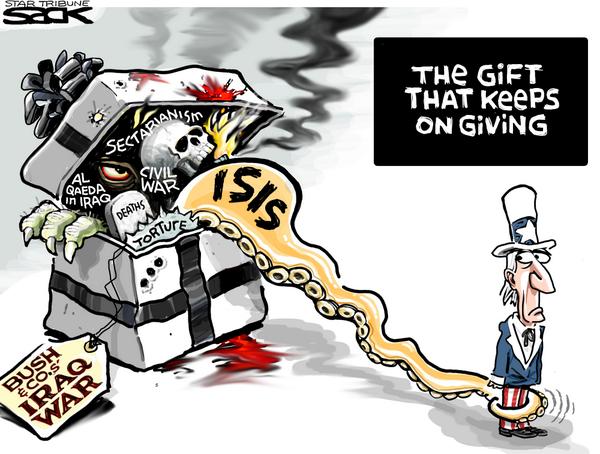The Islamic State in Iraq and Syria (ISIS) or the Islamic State in Iraq and Levant (ISIL) or the Islamic State, the terrorist organization that has seized parts of both countries, has one overarching goal in mind- the creation of an Islamic caliphate. The breadth of this goal alludes to one of the largest dangers this group poses to the region; the range of potential territory, individuals and resources that it could see to be within its sphere of inclusivity. On February 11th, President Obama asked Congress to authorize military efforts against the group that expand beyond airstrike campaigns, and putting American boots on the ground. During his televised address to the nation, in which this plea was made public the President proposed an Authorization to Use Military Force (AUMF) to be used as supportive fallback. [1] To many, the thought of the US entering another military campaign in the same region is disconcerting. These trepidations are not coming from just one side of the Congressional aisle. However, throughout the 20th century, world hegemonic powers have failed to respond appropriately to the atrocities that occur in violent conflicts. Without disregarding the principles of international law and without entering the country into another open-ended war in the Middle East, firm actions need to be taken by the United States as well as the international community against ISIS. Whether that effort includes an expansion of the AUMF bound by the vague terms outlined in President Obama’s war proposal however does not seem to be gucci with everyone.
The staggering 60 words that make up the AUMF gave the President of the United States an unprecedented amount of military power, allowing him to wage war on whomever, wherever and however.
“The President is authorized to use all necessary and appropriate force against those nations, organizations, or persons he determines planned, authorized, committed, or aided the terrorist attacks that occurred on September 11, 2001, or harbored such organizations or persons in order to prevent any future acts of international terrorism against the United States by such nations, organizations or persons.” [2]
1 week after the terrorist attacks, the bill passed the House of Representatives with only one Nay vote from Barbara Lee (D-CA). The Congresswoman stated that supporting the bill would give the White House “a blank check to attack an unspecified country, an unspecified enemy for an unspecified period of time.” [3] While many hastily voted as the memory of the fallen towers flashed before them, Rep. Lee saw the broad terms proving problematic in the future. At the time it’s safe to assume that she was not the most popular Congresswoman, since giving the President the unprecedented power to wage war in the name of American exceptionalism, is in itself un-American. Obviously. The law also allows the President to completely override Congressional approval, however the bill was passed so hastily that this didn’t seem to be mentioned or even considered. It turns out that the law has been used as legislative fallback for everything the US has employed as noted by one lawyer previously within the Bush administration. “This is the legal foundation for everything the U.S. has done from Guantanamo Bay to drone strikes to secret renditions to Navy Seal raids. It’s all been hung off these words.” [4] If that kind of international military action is warranted, then international law may as well cease to exist. The AUMF not only gives the President a legal foundation for the entire campaign focused on combating terror, it also furthers the divide between Congress and the President.
In a recent national poll, 53 percent of Republicans, 36 percent of Democrats and 31 percent of independents are in support of sending ground troops given the current airstrike campaigns fail. [5] John Boehner following the President’s proposal stated that, “If we are going to defeat this enemy, we need a comprehensive military strategy and a robust authorization, not one that limits our options.” [6] Which is quite an interesting take. While it’s apparent that thorough military strategy needs to be formulated, the options are anything but limited. Although the reasoning differs amongst the two, both Democrat and Republican legislators seem to mutually hate the proposal. Dems think it’s too restrictive, while Republicans think it inadequate. Additionally its necessity has come into question, since the AUMF of 2001 gave the President all the powers he would need to wage a war against ISIS. Amongst the population, many individuals are quite opinionated when it comes to ISIS. With video footage of journalists being beheaded and women and children assassinated being streamed for an international audience, the group has successfully sent a chill through the psyche of the American people. The ones who can’t make up their minds in terms of a unified response seems to be Congress. The goal is to send a message to the world that there is bipartisan support for whatever defense strategy is employed against the Islamic State. [7] However in Congress today, bipartisanship is as palpable as Fox News is fair and balanced. Obama already has the authorization to wage war against ISIS regardless of the opposition he faces. If the President’s counterbalance includes taking the country to war, the executive and the congressional majority will have to keep foreign policy at the top of the legislative agenda. Whereas the 2001 AUMF was passed almost unilaterally, the ideological divergence in this case amongst our elected officials in the White House and in Congress, makes defense policy all the more convoluted.
While many Americans feel as though the United States should provide defensive support, naturally memories of Iraq and Afghanistan remain at the forefront of the debate over US intervention. Although the Assad government has not formally asked for external assistance in combating ISIS in Syria, The Syrian National Coalition, (SNC) which has been referred to as the legitimate representatives of the Syrian people by many countries including the United States, has. The leader of the SNC appeared on The Daily Show with Jon Stewart in September 2014, and reiterated that the Free Syrian Army can no longer combat ISIS alone. [8] Since the threat of ISIS became universally recognized, the international community has ignored the impending reality of a much-needed military intervention that expands beyond bombing campaigns. Arming rebel groups and risking the thought of it biting us in the ass has a dark reminiscent tone to it. Taking military strategy to NATO has been stalled because of competing regional interests. A UN intervention makes combatting ISIS even more subject to international political bureaucracy. Whether or not the President faces opposition to his war proposal, because of entrenched political feuds in Congress, may determine what avenue US foreign policy takes during this legislative session. For the United States to play a role in combatting the extremists, a more detailed level of defense strategizing needs to take place, amongst both political parties in Congress. Unfortunately President Obama walked into the trap that both of his predecessors fell into, attempting to enter the country into a war that is sure to outlast his presidency.
References
[1] Acosta, Jim, and Jeremy Diamond. 2015. ‘Obama ISIS Fight Request Sent To Congress’. CNN.
[2] Daskal, Jenneifer, and Stephen Vladeck. 2014. ‘After The AUMF’. Harvard National Security Journal 5: 115-146.
[3]Friedersdorf, Conor. 2014. ‘Angry Letters To The One Member Of Congress Who Voted Against The War On Terror’. The Atlantic.
[4] Sterbenz, Christina. 2014. ‘This 60-Word Sentence Started The ‘War On Terror’ — And Much More’. Business Insider.
[5] Telhami, Shibley. 2015. ‘Are Americans Ready To Go To War With ISIL?’. Politico.
[6] See [1]
[7] Kane, Paul. 2015. ‘Congress Split Over Ways To Face Islamic State’. Washington Post.
[8]Comedy Central, The Daily Show. 2014. September 29, 2014 – Hadi Al-Bahra. Video.



